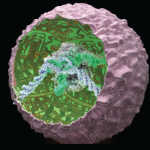NEW YORK (Reuters Health)—In patients with rheumatoid arthritis (RA) refractory to treatment with rituximab or tocilizumab, genetic profiling of synovial biopsies predicted the lack of therapeutic response better than a model using only tissue pathology or clinical factors, researchers say.1 “We believe this study is a paradigm shift in precision medicine in RA,” Dr. Costantino…

Single-Cell Technologies: A Path for New Insights
This ACR Convergence session discussed how recent advances in single-cell technologies are being used in rheumatic disease research.

Familial Patterns in Childhood- & Adult-Onset SLE
A study examining familial patterns of systemic lupus erythematosus (SLE) found a greater decline in SLE recurrence rate by generation in childhood- than in adult-onset SLE, suggesting adult-onset SLE may be characterized by environmental risk factors.

Study Provides Clues to Undefined, Systemic, Autoinflammatory Diseases
A study from October 2019 describes the clinical characteristics of pediatric patients with undefined systemic autoinflammatory diseases. Researchers conducted a genetic analysis and outlined specific variants. They found patients with pericarditis and intellectual impairment may have distinct clinical phenotypes, which may lead to improved diagnostic and treatment options.

How Autoimmune & Non-Autoimmune Family Conditions Predict Rheumatoid Arthritis
New research has incorporated confounders, such as smoking, to build a clearer picture of family-related factors that may help predict who will develop rheumatoid arthritis…

Can Lupus Be Prevented? Research Reveals Clues to Who’s Most Likely to Transition to Classified Disease
How does a patient transition from health to active SLE? This question is the crux of the research conducted by Judith A. James, MD, PhD, and colleagues…

Genetic Discoveries Pave New Pathways to the Origins of Rheumatic Diseases
New research has provided a never-before-seen view of the genetic activity that may be used to map the polygenic nature of common rheumatic diseases. Two recent studies have employed distinct approaches to identify the non-coding gene variants, digging deep into human genetic data to uncover the mechanism of rheumatic diseases…

Chronic Fatigue Syndrome: Why Myalgic Encephalomyelitis Is the Preferred Term and More
CHICAGO—Joseph Breen, PhD, program officer at the National Institutes of Health in Bethesda, Md., opened the chronic fatigue syndrome (CFS) session at the Federation of Clinical Immunology Societies (FOCIS) 2017 meeting by asking presenters to describe the current state of the science to the key immunology stakeholders gathered in the room. The hope was that…

Fellows’ Forum Case Report: Autoinflammatory Diseases and Roles of Genetic, Molecular Testing
A 51-year-old Caucasian female was referred by a local rheumatologist to the Center of Autoinflammatory Diseases at Stony Brook University, N.Y., for an unusual disease presentation. The patient had had recurrent polyarthritis, fever and rash for the previous three years. She described having a migratory polyarthritis affecting the shoulders, knees, ankles and bilateral forefoot, with…

Is an Arthritis Vaccine Using Genetically Reprogrammed Stem Cells on the Horizon?
The words genetically modified are making people run for the hills these days. Not so when it comes to arthritis care, however. In the lab of one pioneering researcher, genetic engineering is catapulting arthritis treatment years ahead. Farshid Guilak, PhD, is a professor in the Department of Orthopaedic Surgery at Washington University, St. Louis, and…